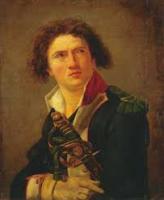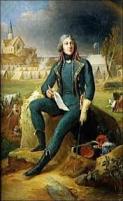Accueil > Nos outils pédagogiques > Pour le Collège > Ce que le Général Hoche a dit de Robespierre
 Ce que le Général Hoche a dit de Robespierre
Ce que le Général Hoche a dit de Robespierre
mardi 6 février 2018
En français
LETTRE DE HOCHE À ROBESPIERRE. ELLE NE LUI EST JAMAIS PARVENUE.
Après avoir, en décembre 1793, libéré Landau et contribué à la reconquête de l’Alsace, le jeune général Lazare Hoche (il a alors 25 ans) est victime de la jalousie du général Pichegru et des agissements de celui-ci auprès du Comité de Salut public.
Il perd le commandement de l’armée de Moselle pour avoir refusé de marcher sur Trêves à cause de l’épuisement de ses troupes. Tombé en disgrâce il est envoyé auprès de l’armée d’Italie, puis suspendu de ses fonctions et décrété d’arrestation le 21 mars 1794 à Nice.
Dirigé sur Paris il est enfermé à la Conciergerie le 16 mai. C’est de là qu’il demande à Fouquier-Tinville de transmettre à Robespierre la lettre suivante... qui ne parviendra jamais à son destinataire.
« L. Hoche à Robespierre,
Le soldat qui a mille fois bravé la mort dans les combats ne la craint point sur l’échafaud ; son seul regret est de ne plus servir son pays et de perdre en mourant l’estime du citoyen qu ’il regarda en tous temps comme son génie tutélaire ; tu connais Robespierre, la haute opinion que j’ai conçue de tes talents et de tes vertus ; les lettres que je t’écrivis de Dunkerque et mes professions de foi sur ton compte, adressées à Bouchotte et à Audouin, en sont l’expression fidèle mais mon respect pour toi n’est pas un mérite, c’est un acte de justice, et s’il est un rapport sur lequel je puisse véritablement t’intéresser, c’est celui sous lequel j’ai pu servir utilement la chose publique. Tu le sais, Robespierre, né soldat, soldat toute ma vie il n ’est pas une seule goutte de mon sang que je n ’aie consacrée à la cause que tu as illustrée. Si la vie, que je n ’aime que pour ma patrie, m’est conservée, je croirai avec raison que je la tiens de ton amour pour les patriotes, si au contraire la rage de mes ennemis m’entraîne au tombeau, j’y descendrai en bénissant la République et Robespierre.
In English
HOCHE’S LETTER TO ROBESPIERRE – WHICH NEVER REACHED HIM
After liberating Landau in December 1793 and contributing to the reconquest of Alsace, the young General Lazare Hoche (he was then 25) was the victim of General Pichegru’s jealousy and intrigues with the Committee of Public Safety.
He lost command of the Army of the Moselle for refusing to march on Trier because of the exhaustion of his troops. In disgrace, he was sent to the army in Italy, then suspended from duty and arrested on 21 March 1794 in Nice.
Sent to Paris, he was imprisoned in the Conciergerie on 16 May. From there, he asks Fouquier-Tinville to send Robespierre the following letter... which will never reach its recipient :
L. Hoche to Robespierre,
The soldier who has braved death a thousand times in battle does not fear it on the scaffold ; his only regret is to no longer serve his country and to lose in dying the esteem of the citizen whom he regarded at all times as his tutelary genius ; you know, Robespierre, the high opinion that I have conceived of your talents and virtues ; the letters I wrote to you from Dunkerque and my professions of faith on your account, addressed to Bouchotte and Audouin, are a faithful expression of this, but my respect for you is not praise, it is an act of justice, and if there is one relation in which I can really concern you, it is the one under which I have been able to be of use to public matters. You know, Robespierre, as a born soldier, a soldier all my life, that there is not a single drop of my blood that I have not dedicated to the cause for you are renowned. If my life, which I love only for my country, is preserved, I will believe with reason that I have it from your love for patriots ; if, on the contrary, the rage of my enemies drags me to the tomb, I will descend there blessing the Republic and Robespierre.
- Hoche was released on August 4, 1794 and appointed Commander-in-Chief of the Army of the West. He undertook the pacification of the Vendée until 1796. After the abortive expedition to Ireland, in 1797 he was appointed to command the armies of Sambre-Meuse and of the Rhine and Moselle, but died of tuberculosis on 9 September 1797.
[1] Hoche est libéré le 4 août 1794 et nommé commandant en chef de l’armée de l’Ouest. Il entreprend jusqu’en 1796 la pacification de la Vendée. Après l’expédition avortée en Irlande il est nommé en 1797 à la tête des armées de Sambre-Meuse et de Rhin et Moselle mais meurt de la tuberculose le 9 septembre 1797.





